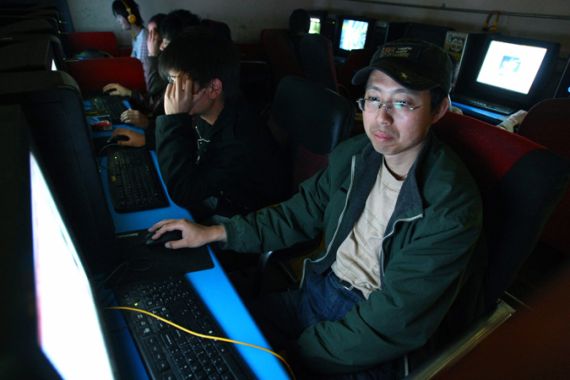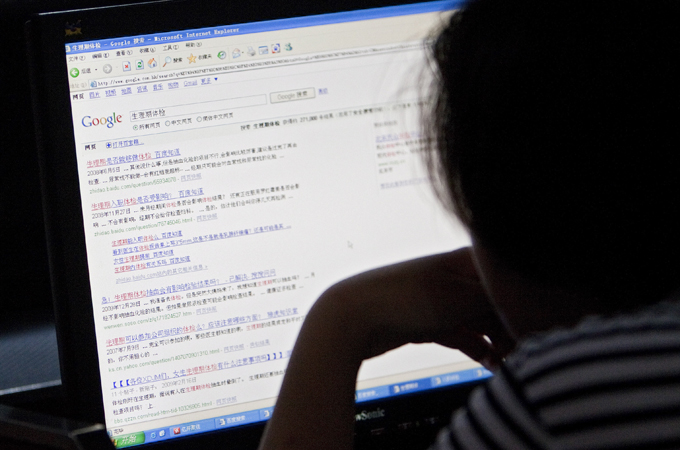China to block internet calling
Government moves to shut down internet phone service providers whose services undercut state-owned operators.

 |
| In early 2010, Google announced that it was no longer willing to comply with government censorship restrictions [EPA] |
China is due to crack down on what it calls illegal internet telephone service providers, according to a circular from the Chinese government.
The move announced on Friday could potentially harm calling services such as Skype, which allow users to talk to one another using the internet in a variety of ways (PC-to-PC, Phone-to-PC or Phone-to-Phone), rather than via a traditional phone line.
Keep reading
list of 4 itemsHong Kong’s first monkey virus case – what do we know about the B virus?
Why will low birthrate in Europe trigger ‘Staggering social change’?
The Max Planck Society must end its unconditional support for Israel
The statement from the Ministry of Information and Industry Technology (MIIT) does not mention any carriers by name, but calls for a crackdown “on illegal VoIP [Voice over Internet Protocol] telephone services”. The ministry is now collecting evidence to pursue legal cases against companies operating such services.
The Skype VoIP service, which is partly owned by web retailer eBay Inc, has been growing in popularity among Chinese individuals and businesses, as it allows users to make cheap or free international phone calls.
The circular from the Chinese government, dated December 10, did not specifically name any companies, and stopped short of elucidating what amounted to “illegal” services.
Spokespeople at the ministry were not available for comment on Friday, but Xi Guohua, a vice-minister at the MIIT, told the Beijing Morning Post that only the three state-owned Chinese telecommunications operators are licensed to provide Internet phone services that link computers to phones.
He clarified that communications between computers (PC-to-PC links) remain open to all service providers in China.
Representatives from Skype have said their service remains operational.
“Skype is not banned,” Jennifer Caukin, a California-based spokesperson for the company, told Bloomberg News.
“Our users in China currently can access Skype via Tom Online, our majority joint venture partner.”
Eunice Lim, a Singapore-based spokeswoman for Skype, said she could not comment on the licensing laws relevant to Skype’s services, but said that Tom Online “has an obligation to be compliant with local laws and regulations”.
Protecting government providers
The move appears to be aimed at protecting three government-controlled Chinese phone carriers – China Telecom, China Unicom and China Mobile – who provide the bulk of China’s telephone services.
Xi said China Telecom and China Unicom have been given licences to operate PC-to-phone services in four cities in a trial basis. He added that the government is considering expanding the programme.
On Thursday, the Hong Kong-based South China Morning Post quoted an unidentified ministry official as saying that VoIP services could only legally be provided by the ‘big three’ Chinese operators.
Critics say the move is aimed at protecting the monopoly of the three state-owned providers.
“Overall this is to take further strong measures to protect the interests of state-owned monopolies,” Kan Kaili, a professor at the Beijing University of Posts and Telecommunications, told the AFP news agency.
Spokespeople for all three companies were unavailable for comment on Friday.
The move has prompted anger from internet users in China, with one user on the the web portal Netease.com commenting that services that were benefiting people were being made illegal.
Other users discussed how the ban could be circumvented by using VPNs (virtual private networks), which allow users to avoid the so-called ‘Great Firewall’, and are already in use by internet users accessing Facebook and Twitter.
Smaller companies
Analysts say the move may be aimed at shutting down smaller domestic providers, rather than taking on international companies.
“A major purpose may be to clear out small, low-visibility companies that are difficult to regulate,” Mark Natkin, managing director of Marbridge Consulting Ltd, a Beijing-based market research firm, told Bloomberg.
“It is much easier to have 10 large companies with a lot on the line, and a lot to lose, because they are likely to be more cooperative,” he said.
In October 2009, UUCall, a Chinese service which called itself “the first Chinese Internet phone brand”, was shut down on suspicion of operating illegal web phone services.
The company resumed business in February 2009 after changing its domain name to being Hong Kong-based.
VoIP calls allow users to make international calls using their existing internet connections, making them, in most cases, much cheaper than the alternative of using a traditional phone line. If both parties are using VoIP, the call is usually free, and can also incorporate other features, such as video chatting or the sharing of computer screens.
Many businesses use VoIP services to cut down on their international phone costs, and stand to lose out on access to the cheaper alternative if the Chinese government follows through with the crackdown.